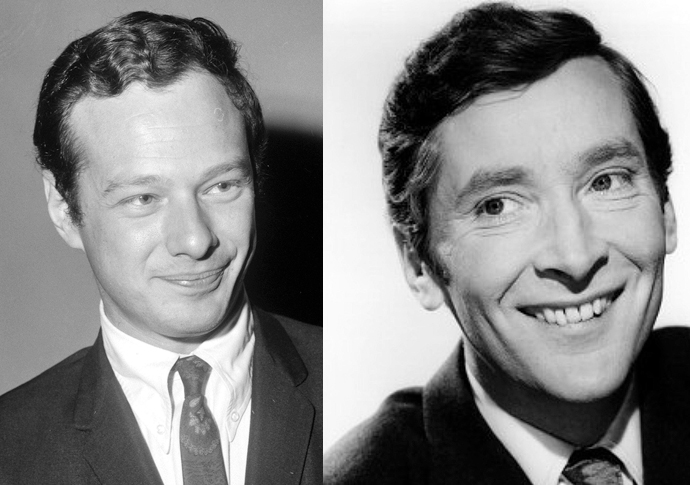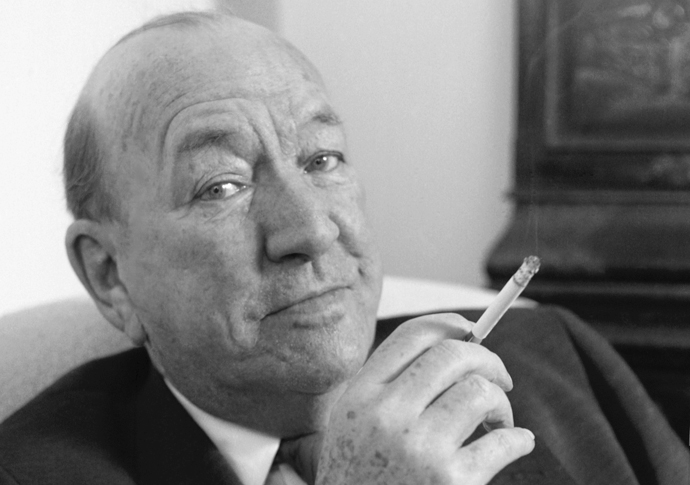Bona contention: how gay men survived post-war Britain
A two-volume anthology recalls fascinating accounts at a time when homosexuality for men was illegal, and many faced prison and blackmail. Peter Gruner reports
Thursday, 30th January 2025 — By Peter Gruner

Brian Epstein and Kenneth Williams [Joop van Bilsen Anefo]
A MONTH before gay Islington writer Joe Orton was murdered by his lover in August 1967, he was trying to comfort his good friend, the ever popular comedian Kenneth Williams, who privately suffered from depression.
The story is one of many fascinating features in the remarkable two-volume anthology, Some Men in London, edited by Peter Parker. It deals with life after the Second World War when homosexuality for men was illegal, and they often faced prison and blackmail.
Parker, who lives in Mile End, told Review the book took about six years to write, requiring a lot of research, which is based on personal diaries, newspapers and literature from the time. He said the books are selling well and there is already interest in a stage version.
Kenneth Williams, famous for the bawdy Carry On comedy films, admitted to Joe Orton that he felt guilty about being homosexual and suffered from depression
Orton, who lived in Noel Road, close to the Angel, wrote in his diary in July 1967: “Kenneth Williams rang. He’s feeling low and depressed. I invited him round for a cup of tea. He accepted with touching gratitude.”
Orton describes how later he walked Kenneth to King’s Cross, where the comic caught a bus to his home in Marylebone Road. “On the way we talked about sex, ” Orton wrote. “You must do whatever you like, I said, as long as you enjoy it and don’t hurt anyone else, that’s all that matters.”
Williams revealed: “I’m basically guilty about being homosexual you see.” Orton replied: “Then you shouldn’t be. Get yourself f***ed if you want to. Reject all the values of society. And enjoy sex. When you’re dead you’ll regret not having fun with your genital organs.”
Weeks later, on August 9 1967, Orton, 34, was bludgeoned to death by his live-in lover Kenneth Halliwell. Halliwell later killed himself by overdosing with sedative Nembutal.
Another soon-to-be famous character suffering for his sexuality was Brian Epstein. In April 1957, four years before he became manager of the Beatles, Epstein had his moment of dread in Swiss Cottage, close to where he then lived as a student actor. He wrote about standing outside Swiss Cottage tube station when he saw a “ man of interest” staring hard at him.

Noel Coward [Allan Warren_CC BY-SA 3.0.tif]
Epstein had been returning home from the Arts Theatre Club in Soho.
The man follows Epstein along Belsize Road. There’s a brief nervous conversation between the two men when they talk of going somewhere together. Epstein, obviously nervous, decides he needs to get home early and walks away. Suddenly the man reveals he is a policeman and is joined by a colleague.
Epstein is arrested for “persistent importuning”. He is later sentenced to two years’ probation at Marylebone magistrate’s court.
Parker includes the views of a collection of famous men, mainly from the entertainment world, including Sir John Gielgud, Noel Coward, JB Priestley, John Osborne, Christopher Isherwood and Wilfred Brambell. Brambell will be remembered as the dad in the rag and bone BBC TV show Steptoe and Son.
Although the law against homosexuality was considered by many to be unfair since Victorian times, it wasn’t until 1957 that the Wolfenden Report recommended legalisation. And it was another 10 years – 1967 – before Labour prime minister Harold Wilson, under the guidance of Roy Jenkins, legalised homosexual acts in private between two men over the age of 21.
Writer JB Priestley compared London with Paris. Homosexuality was decriminalised in France in the late-18th century. Priestley said, “In Paris, homosexuality is openly discussed, just because the police are not threatening it.”
Few were more outspoken than Noel Coward, playwright, composer, singer and actor. He spoke out in 1955 after the Magistrates’ Association voted down a move to legalise homosexuality.
Coward said: “It is hard to believe, in this scientific psychiatric age when so many mysteries have been made clear, even for the layman, that a group of bigoted old gentlemen should have the power to make the administration of British justice a laughing stock in the civilised world.”
The books contain much of the angst and anger of men being unfairly penalised for their sexual affection for each other, but also some wonderful humour.
On radio and TV in the early days homosexual men were often the objects of crude and derogatory jokes.
Then in 1965 the BBC’s hugely popular radio show, Round The Horne, introduced two outrageous camp men, Julian and Sandy, played by queer actors, Hugh Paddick and, yes, comedian Kenneth Williams. And guess what? They made fun of everyone, including heterosexuals.
Radio listeners of a certain age will probably remember Round The Horne. The show’s straight man Kenneth Horne would announce: “Hello, anybody there?” To which Julian would reply: “Hello, I’m Julian, and this is my friend, Sandy.” It was always full of double meanings, particularly when Sandy would say: “Oh, hello Mr Horne. Oh dolly to vada your eek. What brings you trolling in here.”
• Some Men in London: Queer Life Volume 1, 1945-1959 and Volume 2, 1960-1967. Edited by Peter Parker, Penguin Classic, £30